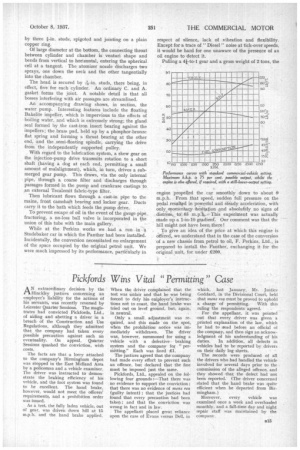Pickfords Wins Vital "Permitting" Case
Page 49

If you've noticed an error in this article please click here to report it so we can fix it.
AN extraordinary decision by the Hinckley justices concerning an employer's liability for the actions of his servants, was recently reversed by Leicester Quarter Sessions. The magistrates had convicted Pickfords, Ltd., of aiding and abetting a driver in a breach of the Construction and Use Regulations, although they admitted that the company had taken every possible precaution against such an eventuality. On appeal, Quarter Sessions quashed the conviction, with costs.
The facts are that a lorry attached to the company's Birmingham depot was stopped in the East Midland Area by a policeman and a vehicle examiner. The driver was instructed to demonstrate the braking efficiency of his vehicle, and the foot system was found to be excellent_ The hand brake, however, would not meet the officers' requirements, and a prohibition order was issued.
As a test, the fully laden vehicle, out Of gear, was driven down hill at 15 m.p.h. and the hand brake applied.
When the driver complained that the test was unfair and that he was being forced to defy his employer's instructions not to coast, the hand brake was tried out on level ground, but, again. in neutral.
Only a small adjustment was required, and this made on the spot, when the prohibition notice was immediately withdrawn. The driver was, however, summoned for using a vehicle with a defective• braking system and the company for "permitting." Each was fined 41.
The justices agreed that the company had made every effort to prevent such an offence, but declared that the fine must be imposed just the same.
Pickfords, Ltd., appealed on the following four grounds :—That there was no evidence to support the conviction ; that there was no evidence of mess rea (guilty intent) ; that the justices had found that every precaution had been taken ; and that the conviction was wrong in fact and in law.
The appellant placed great reliance upon the case of Evans versus Dell, in
which, last January, Mr. Justice Goddard, in the Divisional Court, held that MOSS rea must be proved to uphold
a charge of permitting. With this ruling the respondents agreed. .
For the appellant, it was pointed .out that every driver was given a _printed explanation of the law, which he had to tread before an official of the company, and then sign an acknowledgment of his understanding of his duties. In addition, all defects in vehicles had to be reported by drivers on their daily log sheets.
The records were produced of all the drivers who had handled the vehicle involved for several days prior to the commission of the alleged offence, and they showed that the defect had not been reported; (The driver concerned stated that the hand brake was quite efficient when he departed from Birmingham.) Moreover, every vehicle was examined once a week and overhauled monthly, and a full-time day and night repair staff was maintained by the company.




























































































